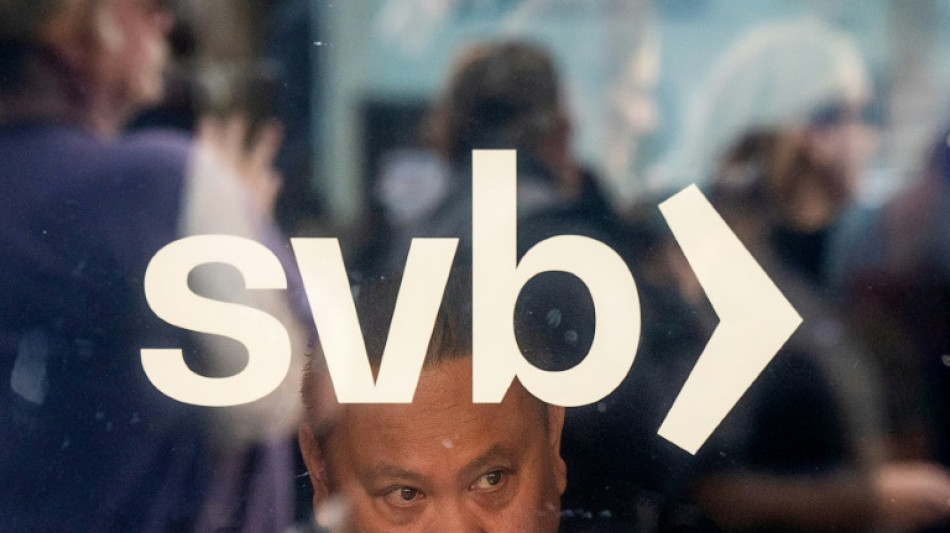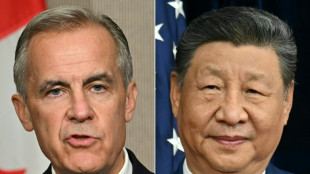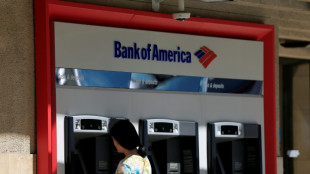
-
 Five things to know about Uganda
Five things to know about Uganda
-
Uganda votes under internet blackout and police crackdown

-
 Dreams on hold for Rohingya children in Bangladesh camps
Dreams on hold for Rohingya children in Bangladesh camps
-
Canada's Carney in Beijing for trade talks with Chinese leaders

-
 All Blacks fire coach Robertson less than two years before World Cup
All Blacks fire coach Robertson less than two years before World Cup
-
Long-awaited EU-Mercosur trade pact set for signing

-
 Trump embraces AI deepfakes in political messaging
Trump embraces AI deepfakes in political messaging
-
A year of Trump: US health policy reshaped in RFK Jr's image

-
 One year in, Trump shattering global order
One year in, Trump shattering global order
-
Hit TV show 'Heated Rivalry' a welcome surprise for gay hockey community

-
 Spanish singer Julio Iglesias prepares defence against abuse allegations: Hola! magazine
Spanish singer Julio Iglesias prepares defence against abuse allegations: Hola! magazine
-
Actor McConaughey seeks to patent image to protect from AI

-
 Musk's Grok barred from undressing images after global backlash
Musk's Grok barred from undressing images after global backlash
-
Hosts Morocco set up Senegal AFCON final showdown

-
 Trump says Iran killings stopped, Tehran says 'no plan for hanging'
Trump says Iran killings stopped, Tehran says 'no plan for hanging'
-
Chelsea paid for costly errors in Arsenal defeat, says Rosenior

-
 Morocco beat Nigeria on penalties to reach Africa Cup of Nations final
Morocco beat Nigeria on penalties to reach Africa Cup of Nations final
-
Golden Globes viewership shrinks again

-
 Astronauts leave ISS in first-ever medical evacuation
Astronauts leave ISS in first-ever medical evacuation
-
NASA reports record heat but omits reference to climate change

-
 Trump praises 'terrific' new Venezuela leader after call
Trump praises 'terrific' new Venezuela leader after call
-
Real Madrid crash out of Copa del Rey at Albacete on Arbeloa debut

-
 Trump says Iran killings stopped as US scales back Qatar base
Trump says Iran killings stopped as US scales back Qatar base
-
Arsenal beat Rosenior's Chelsea in League Cup semi first leg

-
 US stocks fall again as Iran worries lift oil prices
US stocks fall again as Iran worries lift oil prices
-
Inter extend Serie A lead to six points after Napoli slip

-
 Bayern beat Cologne to move 11 points clear in Bundesliga
Bayern beat Cologne to move 11 points clear in Bundesliga
-
Mane takes Senegal past Egypt into final of his last AFCON

-
 Trump says Greenland will 'work out' after Denmark fails to bridge gap
Trump says Greenland will 'work out' after Denmark fails to bridge gap
-
'Bridgerton' premieres in Paris promising 'Cinderella with a twist'

-
 California begins probe of Musk's Grok over sexualized AI images
California begins probe of Musk's Grok over sexualized AI images
-
Astronauts set to leave ISS in first-ever medical evacuation

-
 Napoli's stalemate with Parma opens door for Serie A leaders Inter
Napoli's stalemate with Parma opens door for Serie A leaders Inter
-
Syrian leader urges Kurdish integration as army sends troops east of Aleppo

-
 Denmark says White House talks failed to alter US designs on Greenland
Denmark says White House talks failed to alter US designs on Greenland
-
Venezuela looking to 'new era' after Maduro ouster, says interim leader

-
 Mane takes dominant Senegal past Egypt into AFCON final
Mane takes dominant Senegal past Egypt into AFCON final
-
UK police admit 'mistakes' over Maccabi Tel Aviv fan ban

-
 Promoter says Joshua will return to ring when 'time is right' after horror crash
Promoter says Joshua will return to ring when 'time is right' after horror crash
-
California investigating Grok AI over lewd fake images

-
 Wales's Faletau set to miss bulk of Six Nations
Wales's Faletau set to miss bulk of Six Nations
-
Denmark, Greenland wrap up crunch White House talks

-
 England sweating on Fin Smith's fitness for Six Nations opener
England sweating on Fin Smith's fitness for Six Nations opener
-
NASA acknowledges record heat but avoids referencing climate change

-
 England rugby league coach Wane quits role
England rugby league coach Wane quits role
-
Oil prices extend gains on Iran worries

-
 European basketball pioneer Schrempf lauds 'global' NBA
European basketball pioneer Schrempf lauds 'global' NBA
-
Denmark, Greenland in crunch White House talks as Trump ups pressure

-
 Mitchell hits ton as New Zealand down India to level ODI series
Mitchell hits ton as New Zealand down India to level ODI series
-
Syrian army tells civilians to stay away from Kurdish positions east of Aleppo


Two weeks of banking turbulence
After three US regional lenders collapsed and UBS swooped to buyout troubled Credit Suisse to avoid a wider crisis, AFP looks back at the last two weeks of banking turbulence:
- Silvergate Bank -
The turmoil begins the night of March 8 with a liquidation announcement from Silvergate Bank, a US regional lender and favourite among the cryptocurrency crowd.
The California business had been swept up in several crypto mishaps, particularly the implosion of exchange platform FTX, before facing a wave of sudden withdrawals.
On March 10 the crypto banking giant says it plans to close.
- Silicon Valley Bank -
On the same night of March 8, Silicon Valley Bank announces it is facing a huge run of unexpected withdrawals.
In an attempt to raise cash, the bank loses $1.8 billion in the sale of a bond portfolio whose value dropped following interest rate hikes by the US Federal Reserve.
SVB, a key lender to startups across the US since the 1980s and the country's 16th-largest bank by assets, had been hit by the tech sector slowdown as cash-hungry companies rushed to get their hands on their money.
The announcement by SVB spooks investors and clients, and sparks a run on deposits.
On March 10 the bank collapses -- the biggest US banking failure since the 2008 financial crisis -- prompting regulators to seize control the same day.
The Federal Deposit Insurance Corporation (FDIC) takes over the bank and says it will protect insured deposits -- those up to $250,000 per client.
In a statement on March 12, the Federal Reserve, the Treasury Department and the FDIC step in, announcing that SVB depositors will have access to "all of their money" starting Monday March 13, and American taxpayers will not have to foot the bill.
So far regulators have been unable to find a buyer for SVB and are now considering breaking up the bank, according to Bloomberg.
- Signature Bank -
The March 12 statement also reveals that Signature Bank, the 21st-largest in the United States, has been automatically closed and its customers will benefit from the same measures as those at SVB.
On March 19 the FDIC says it has struck a deal to sell most of the assets of Signature Bank to Flagstar Bank, a subsidiary of New York Community Bancorp.
Signature Bank held deposits of $88.6 billion as of December 31, the FDIC statement says, adding that the bank's 40 branches will open under Flagstar on Monday.
- First Republic Bank -
San Francisco-based First Republic Bank -- the 14th largest US bank by assets -- sees its stock market valuation plunge as of March 9 and its shares tumble over the next week.
On March 16, Wall Street titans including JP Morgan, Bank of America and Citigroup pledge to deposit $30 billion into the lender.
But despite the rescue package, on Sunday ratings agency Standard & Poor's (S&P) downgrades First Republic's long-term issuer credit rating from BB+ to B+.
The agency warns it could further lower the bank's rating if there is no progress in stabilising deposits.
First Republic Bank makes assurances that with the $30 billion injection the lender is "well positioned to manage short-term deposit activity."
- Credit Suisse -
On March 15 the shares of Credit Suisse, Switzerland's second-largest bank and considered the "weakest link" in the Swiss banking sector, go into freefall.
In a bid to calm the markets, Credit Suisse announces it will borrow 50 billion francs ($54 billion) from the Swiss central bank to reinforce the group.
After recovering some ground on March 16, Credit Suisse shares close down eight percent the next day at 1.86 Swiss francs as the Zurich-based lender struggles to regain investors confidence.
In a crunch weekend, UBS -- Switzerland's biggest bank -- says Sunday it will buy Credit Suisse for $3.25 billion in hopes of stopping a wider international banking crisis.
The takeover will create a banking giant unprecedented in the history of Switzerland, where banking is a core part of the national identity.
burs-eab/jmy/lth
K.AbuTaha--SF-PST

